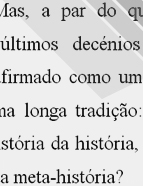

................................
It is essential to explore the exchange of ideas with other historians, both national and international, as well as the intertextualities with other historiographical works, for instance, the reception of the Annales in Portugal. The Dicionário de Historiadores Portugueses [Dictionary of Portuguese Historians] (1779-1974) will undoubtedly contribute to deepening the understanding of these authors' thoughts and the relationship between history and other human sciences. The relationship between Brazilian anthropologist Gilberto Freyre and Portuguese historical culture is an example worth exploring further .
The ways in which historians assert and legitimise themselves is an aspect that has been overlooked in case studies and historiographical research. How and where did they begin their research? What was the significance of periodicals in their debut and establishment as authors? In which social networks were they embedded? To which intellectual genealogies did they lay claim? As heirs and producers of historical memory, some historians also constructed their own memories, writing about their formative years, their university peers, and their craft. Some participated in surveys and interviews (from 1988, under the title Espelho de Clio, the journal Ler História [Reading History] began publishing a series of Portuguese historians). Others, as noted, produced sectoral assessments of Portuguese historiography in various fields of study. It is also important to consider how a historian self-identifies. How does a historian represent their place within the national and European historiographical landscape? Are they part of a network? What intellectual genealogy do they claim for themselves? Among 20th-century Portuguese historians, two cases are exemplary in this respect. Vitorino Magalhães Godinho (1918–2011) occupies a distinctive position in the Portuguese historiography of his time, not least because of how he self-identified. In one of his most influential books, Godinho detailed in his curriculum the Portuguese and foreign authors who had influenced his intellectual formation: António Sérgio, Jaime Cortesão, Duarte Leite, and Veiga Simões (Portuguese) and, "among the foreigners, Lucien Febvre, Fernand Braudel, Georges Gurvitch, Marcel Bataillon, and the work of Marc Bloch ". He established the theoretical focus of his work: "…to contribute to forging a historical and structuralist methodology rooted in Marx and in the intellectual current of the 'Annales' school of Bloch and Febvre" (Estrutura da antiga sociedade portuguesa [Structure of the former Portuguese society] 1977, p. 5). He formulated critical reflections on the Faculty from which he had earned his degree in History and Philosophy (where he also taught for a brief period from 1942 to 1944) and on other academic and research environments where he worked.
